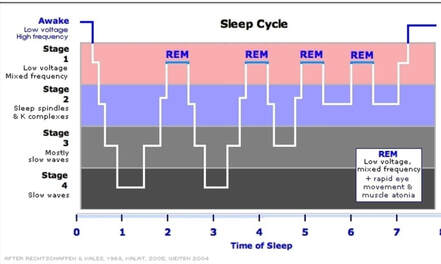|
Sleep is essential for recovery and can be just as important as getting in hard workouts. I know it is tough to prioritize sleep, especially with the demands of balancing work, family, and social life, but my goal is to give you some information to help you maximize your sleep quality. Most of the information from this post will come from the book "Power Sleep" by Dr. James Maas. Dr. Maas, creator of the term 'power nap', was a professor of mine at Cornell. His class was so popular that it had about 2,000 students each semester and was held in Cornell's largest concert hall. After participating in one of his research studies my freshman year, I was convinced to give sleep a higher priority. At the time, I had been struggling to balance my course load with training and traveling to meets. Shifting my focus to sleep significantly improved my athletic performance, as well as other aspects of my life. I still treat sleep as an crucial part of my training today.
REM Sleep for Skills & Visualization Rapid eye movement (REM) sleep is another essential stage for runners. During this stage of sleep, rapid firing of random neuronal pathways occurs. These pathways hold information that was learned that day and studies have shown that those who spend the most time in REM sleep are the best at grasping new skills. For runners, skills solidified during REM sleep can include drills, mental preparation, and even tactics learned from racing. I definitely spent a lot of time visualizing this race from the 2013 Heptagonal Championships. Visualizing a race is a form of practice and sleeping on those visualizations helped me execute my race as planned. During REM sleep, neurotransmitters are also replenished, giving one the mental energy to go out and run. Are you getting enough sleep? Most of us are so habituated to lower levels of alertness that we don't remember what it is like to feel wide awake and able to perform at an optimal level. If you want to assess your own level of alertness, you can take the Multiple Sleep Latency test online. In the meantime, some common indicators of sleep deprivation include: •falling asleep as soon as you get into bed (it should take about 20 minutes) •feeling sleepy during non-stimulating activities (driving, listening to a boring meeting, or watching TV) •needing an alarm clock to wake up in the morning •struggling to get out of bed in the morning •sleeping more on the weekends •falling asleep in your college team locker room 😂 Thank you to my former teammate who allowed the use of this great photo Establish a Regular Sleep Schedule Going to bed at the same time every night and rising at the same time every morning is essential for getting into a good sleep routine. Being consistent with the hours you spend in bed will allow these hours to synchronize with the sleepy phase of your biological clock. It is tempting to make up for sleep on the weekends, but according to Dr. Maas, "You cannot make up for sleep losses during the week by sleeping in on weekends anymore than you can make up for lack of regular exercise and overeating during the week by working out and dieting only on the weekends." Altering your sleep during the weekend will only throw off your biological clock more, making it harder to get adequate sleep during the week. And yes, this is a photo of my dad and I, circa 1991, when I was probably really messing with his biological clock 😈
1 Comment
|
Archives
November 2020
Categories |




 RSS Feed
RSS Feed